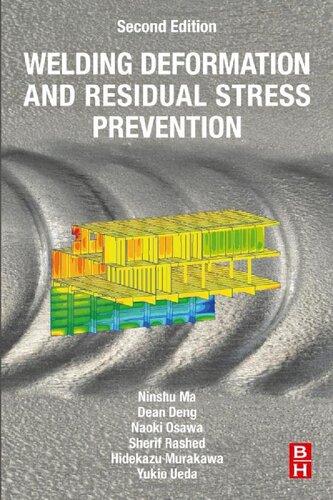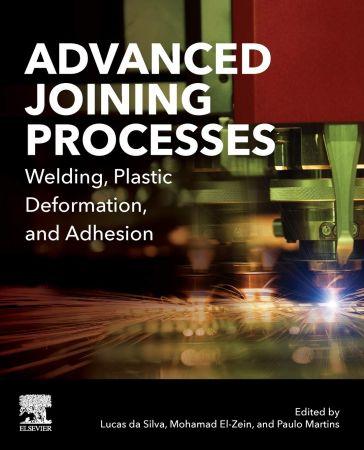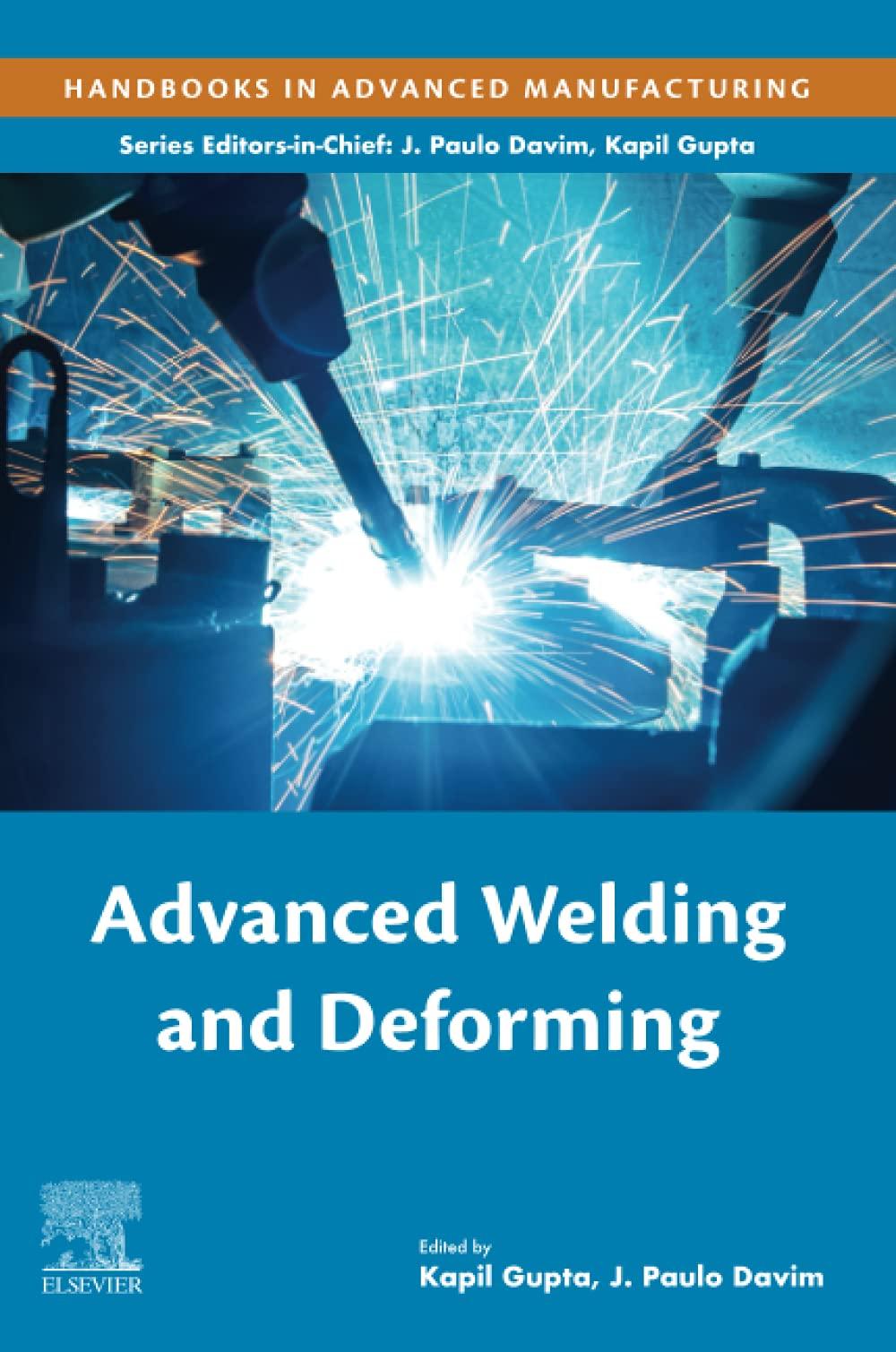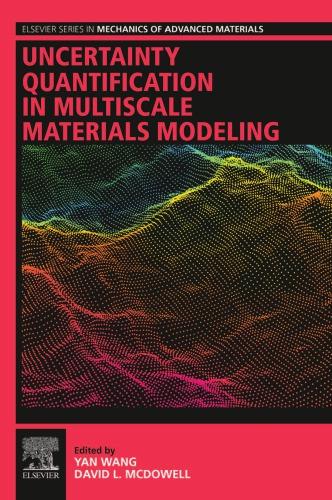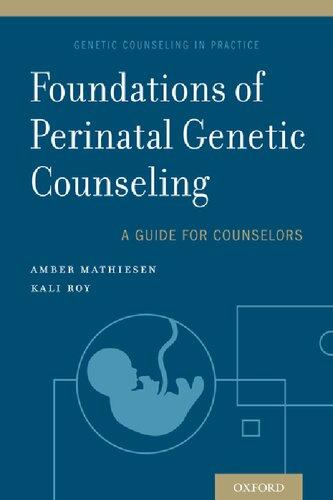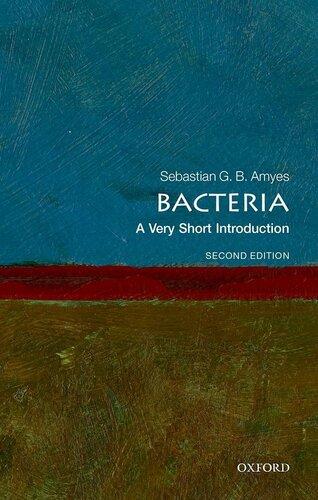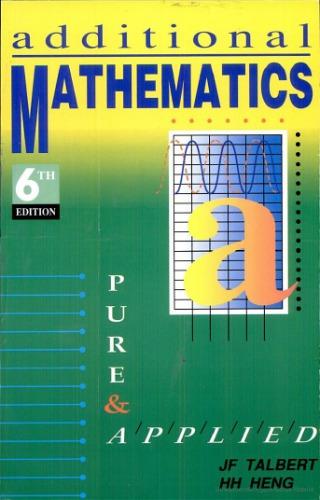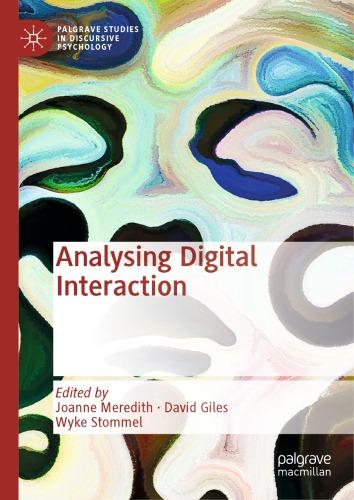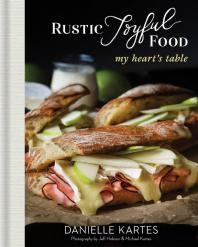https://ebookmass.com/product/welding-deformation-and-
Instant digital products (PDF, ePub, MOBI) ready for you
Download now and discover formats that fit your needs...
Advanced Joining Processes: Welding, Plastic Deformation, and Adhesion Lucas F. M. Da Silva
https://ebookmass.com/product/advanced-joining-processes-weldingplastic-deformation-and-adhesion-lucas-f-m-da-silva/
ebookmass.com
Stress Management and Prevention: Applications to Daily Life 3rd Edition – Ebook PDF Version
https://ebookmass.com/product/stress-management-and-preventionapplications-to-daily-life-3rd-edition-ebook-pdf-version/
ebookmass.com
Advanced Welding and Deforming Kapil Gupta
https://ebookmass.com/product/advanced-welding-and-deforming-kapilgupta/
ebookmass.com
Uncertainty Quantification in Multiscale Materials Modeling Mcdowell https://ebookmass.com/product/uncertainty-quantification-inmultiscale-materials-modeling-mcdowell/
ebookmass.com
Foundations of perinatal genetic counseling : a guide for counselors Kali Roy
https://ebookmass.com/product/foundations-of-perinatal-geneticcounseling-a-guide-for-counselors-kali-roy/
ebookmass.com
Bacteria: A Very Short Introduction 2nd Edition Sebastian G. B. Amyes
https://ebookmass.com/product/bacteria-a-very-short-introduction-2ndedition-sebastian-g-b-amyes/
ebookmass.com
Additional Mathematics - Pure and Appl. 6th ed. Edition J. Talbert
https://ebookmass.com/product/additional-mathematics-pure-andappl-6th-ed-edition-j-talbert/
ebookmass.com
Analysing Digital Interaction 1st Edition Edition Joanne Meredith
https://ebookmass.com/product/analysing-digital-interaction-1stedition-edition-joanne-meredith/
ebookmass.com
Vis u00e0 vis: Beginning French (Student Edition) 5th Edition, (Ebook PDF)
https://ebookmass.com/product/vis-a-vis-beginning-french-studentedition-5th-edition-ebook-pdf/
ebookmass.com
Rustic Joyful Food: My Heart's Table 2nd Edition Danielle Kartes
https://ebookmass.com/product/rustic-joyful-food-my-hearts-table-2ndedition-danielle-kartes-2/
ebookmass.com
WeldingDeformationandResidual StressPrevention WeldingDeformation andResidualStress Prevention SecondEdition
NinshuMa
JoiningandWeldingResearchInstitute,OsakaUniversity,Osaka,Japan
DeanDeng
CollegeofMaterialsScienceandEngineering,ChongqingUniversity, Chongqing,China
NaokiOsawa
DepartmentofNavalArchitectureandOceanEngineering,Osaka University,Osaka,Japan
SherifRashed
JoiningandWeldingResearchInstitute,OsakaUniversity,Osaka,Japan
HidekazuMurakawa
JoiningandWeldingResearchInstituteOsakaUniversity,Osaka,Japan
YukioUeda
JoiningandWeldingResearchInstitute,OsakaUniversity,Osaka,Japan
Butterworth-HeinemannisanimprintofElsevier
TheBoulevard,LangfordLane,Kidlington,OxfordOX51GB,UnitedKingdom 50HampshireStreet,5thFloor,Cambridge,MA02139,UnitedStates
Copyright©2022ElsevierInc.Allrightsreserved.
Nopartofthispublicationmaybereproducedortransmittedinanyformorbyanymeans,electronicor mechanical,includingphotocopying,recording,oranyinformationstorageandretrievalsystem,without permissioninwritingfromthepublisher.Detailsonhowtoseekpermission,furtherinformationaboutthe Publisher’spermissionspoliciesandourarrangementswithorganizationssuchastheCopyrightClearance CenterandtheCopyrightLicensingAgency,canbefoundatourwebsite: www.elsevier.com/permissions
ThisbookandtheindividualcontributionscontainedinitareprotectedundercopyrightbythePublisher (otherthanasmaybenotedherein).
Notices
Knowledgeandbestpracticeinthisfieldareconstantlychanging.Asnewresearchandexperiencebroaden ourunderstanding,changesinresearchmethods,professionalpractices,ormedicaltreatmentmaybecome necessary.
Practitionersandresearchersmustalwaysrelyontheirownexperienceandknowledgeinevaluatingand usinganyinformation,methods,compounds,orexperimentsdescribedherein.Inusingsuchinformation ormethodstheyshouldbemindfuloftheirownsafetyandthesafetyofothers,includingpartiesforwhom theyhaveaprofessionalresponsibility.
Tothefullestextentofthelaw,neitherthePublishernortheauthors,contributors,oreditors,assumeany liabilityforanyinjuryand/ordamagetopersonsorpropertyasamatterofproductsliability,negligenceor otherwise,orfromanyuseoroperationofanymethods,products,instructions,orideascontainedinthe materialherein.
ISBN:978-0-323-88665-9
ForinformationonallButterworth-Heinemannpublications visitourwebsiteat https://www.elsevier.com/books-and-journals
Publisher: MatthewDeans
AcquisitionsEditor: DennisMcGonagle
EditorialProjectManager: FernandaA.Oliveira
ProductionProjectManager: SuryaNarayananJayachandran
CoverDesigner: MilesHitchen
TypesetbySTRAIVE,India
Preface Sincearcweldingwasinventedinthelate19thcentury,weldinghasbeenwidelyused asanessentialtechnologyformetaljoininginconstruction.Generally,weldingproducesdeformationandresidualstressinweldedproducts,whichinfluencesthequality andperformanceoftheseproducts.Weldingheatinputisfromtheweldingarcorlaser beamorelectronbeam.Thisheatinducesmeltingofthemetalandconductsinthe joint.Localexpansionandcontractioninthejointresultinweldingdeformation andresidualstress.Manyengineersandresearchershaveexpendedgreateffortsto findwaystocontroltheseincidents.However,weldingdeformationandresidual stressstillremainasdifficultengineeringproblems.Thisisbecausethephenomena associatedwithweldingarecomplexandinterdisciplinary.
Afterthedigitalcomputerwasinvented,newcomputationaltheoriesandmethods weredeveloped,oneofwhichisthefiniteelementmethod.Thismethodisapowerful numericalanalysistooltosolvecomplexproblems.Theauthor’sresearchgrouphas developedmanycomputationalmethodsofanalysisforweldingmechanicsbasedon thefiniteelementmethod.
In1971,UedaandYamakawa [1] succeededinanalysisofthermalelastic-plastic behaviorofbuttjointsoftwoplatesduringweldingandpublishedapaperonthis pioneeringwork.Sincethen,thegrouphascontinuedtoanalyzevarioustypesof weldedjoints,includingmultipassjointsofverythickplates.Withtheseefforts, thegroupestablishedasimulationmethodofthermalelastic-plasticbehaviorof weldedjoints.
Inparallelwiththeseanalyses,theyexaminedtheaccuracyoftheanalysis,comparingwithresidualstressesmeasuredonexperimentalmodels.Duringthisprocess, theypaidspecialattentiontothesourceofresidualstress,calledinherentstrain,and developedaveryefficientmethodtopredictweldingresidualstressanddeformation. Additionally,theypresentedanewrationalmeasuringmethodofthree-dimensional residualstressinthickweldedjoints,utilizingaspecialfeatureoftheinherentstrain method,whichtheydiscovered.Themethodsofanalysis,prediction,andmeasurementofwelddeformationandresidualstresshavebeenfurtheradvanced,andaframeworkofcomputationalweldingmechanicshasbeenestablished [2].
Safetyrequirementsforweldedstructuresarebecomingincreasinglystrict.To meettheserequirements,engineersengagedinstructuraldesignandqualitycontrol oftenneedtoanticipateweldingdeformationandresidualstresseswithhigheraccuracy.Thischangingengineeringenvironmentrequiresthemtohavemoreopportunitiestoconductweldinganalysisutilizingcommercialsoftware,eithergeneralor specializedforwelding.Inordertousesuchsoftwareandevaluatetheoutputeffectively,inexperiencedengineersneedabasicunderstandingofweldingmechanicsand goodpracticeinhandlingthesoftware.
Thefirstedition [3] ofthisbookwaswrittentomeetthisdemand,anditprovided thefollowingelements:
1.Thegenerationmechanismofweldingdeformation,residualstress,andinherentstrainwas illustratedusingasimplethree-barmodel,andthroughtheillustration,basictheorieswere formulatedandanalysisprocedureswerepresented.
2.AFEMprogram,UserQ&A,and21setsofsampledatawereprovidedtopracticethebasic analysisofheatconduction,deformation,andresidualstressduetoweldingunderbasic planestressandplanedeformationconditions.
3.Examplesofstrategicmethodsandprocedurestosolvevariouswelding-relatedproblems encounteredintheprocessofconstructionwerepresented.
4.Appendicesprovideddatabasesforweldingresidualstressesinvarioustypesofjoints, temperature-dependentmaterialproperties,andthebasicthree-dimensionalequations, amongotherdata.
Tenyearshavepassedsincethefirsteditionwaspublishedin2012.Newtechnology hasbeendevelopedandmorewelding-relatedproblemsareyieldingtocomputational analysisandsynthesis.Itwasthoughttobeappropriatetoupdatethefirsteditionand addnewmaterialaddressingweldingmechanics-relatedproblems.
Inthesecondedition,thefirstthreechaptersarethesameasthoseinthefirstedition.In Chapters1,2,and3,themechanismofproductionofresidualstress,deformation,andinherentstrainduringweldingisillustratedusingthesimplethree-bar modelundergoingtypicalweldingthermalcycles.Therelationalexpressionsbetween themarederived.Throughtheillustration,withtheaidoftheinherentstrainmethod, thefundamentaltheoryofmeasurementofresidualstressisformulated,andtheproceduresofpredictionofresidualstressanddeformationarepresented.Consideringthe factthatthree-dimensionalfiniteelementanalysisiscommonlyusednowadays, Chapters4,5,and6 ofthefirsteditionweredeletedinthesecondedition.
Inthenew Chapter4 ofthesecondedition,variousadvancedcomputingmethods ofweldingthermal-mechanicsareintroduced,includingheatsourcemodels,andthe finiteelementmethodforheattransferandthermalstressanalysis.In Chapter5,thermalelastic-plastic-creepbehaviorisintroducedusingasimplebarmodel,andwelding residualstressdistributionsintypicaljointsarediscussedbasedonsimulationresults andmeasureddata.In Chapter6,practicalanalysismethodsincludingmodeling methodsforweldingassemblydeformationareintroduced. Chapter7 presentspredictionexamplesofweldingdeformationforlarge-scalestructuralmodelsandcoversthe influenceofconstraintconditionsandfabricationsequencesonstructuraldeformation. Chapter8 discussesnumericallycomputedandexperimentallymeasuredresidualstressanddeformationinadditivemanufacturing,suchas3Dmetalprintingand surfaceimprovementtechniques. Chapter9 reusesSections7.1–7.6from Chapter7 of thefirstedition,presentingstrategicanalysisofweldingresidualstressfor manufacturingproblemssuchaswelding-inducedcracking,andimplementstheinfluenceofresidualstressonfatiguesafetyaswellasbucklingbehaviorofweldedstructuresinthenewSections9.6–9.10.InAppendix,adatabaseofweldingresidual distributionsinvariousweldedjointsissummarized.
Thissecondeditionofthebookhasbeenwrittenforthepracticingengineerwho wishestoutilizecomputationalanalysisandpredictionofweldingresidualstressand deformationintheirpracticalwork,aswellasforresearcherswhoareengagedwith weldingmechanics-relatedproblems.Theauthorsbelievethattheeffortsofthe readersshouldcontributetodevelopingtheirowncomputationalanalysis-based manufacturing.
NinshuMa
DeanDeng
NaokiOsawa
SherifRashed
HidekazuMurakawa
YukioUeda
References [1] Y.Ueda,T.Yamakawa,Analysisofthermalelastic-plasticstressandstrainduringwelding byfiniteelementmethod,Trans.Jpn.Weld.Soc.2(2)(1971)90–100.
[2]Y.Ueda,Apioneerofcomputationalweldingmechanicsandultimatestrengthanalysis (ISUM),halloffame,ShipsOffshoreStruct.(2020), https://doi.org/10.1080/ 17445302.2020.1855500
[3] Y.Ueda,H.Murakawa,N.Ma,WeldingDeformationandResidualStressPrevention,first ed.,Butterworth-Heinemann,Elsevier,2012.ISBN978-0-12-394804-5.
Listofsymbols A Area,cross-sectionalarea
A (exp:4.60)MaterialconstantinNorton-Baileyequation
A (4.121)Materialparameterforbackstresscalculation
A0
[A](4.26)Conductivitymatrix
a WeldpoolradiusintheGoldakheatsourcemodel
a Cracklength
B({T})Residualerror
[B]Strain-displacementmatrix
BF Halfbreadthofflange
Bw Heightofweb
b WeldpoolwidthintheGoldakheatsourcemodel
b KineticparameterinJMAKequation
b Widthoftheshellelementsadjacenttotheweldline
b0 Halfwidthofinherentstrainzoneincaseofinfinitive platewidth
C (4.122)Materialparameterforbackstresscalculation
C0 Radiationconstantforblackbody(Stefan-Boltzmann constant)
[C]e (4.23b)Dampingmatrixofcorrespondingeachelement
[C]Heatcapacitymatrix
[C](4.23)Dampingmatrix
c Specificheat
c (4.113)Propagationspeedofstresswaveinmaterials
c (4.120)Backstress
af, ar WeldpoollengthintheGoldakheatsourcemodel
cij (4.120)Backstresstensor
[D]Elasticitymatrix
Dstrain,[Dstrain] Dtemp,[Dtemp] Dtime,[Dtime]
[De](4.66)Elasticmatrix
[Dep](4.91)Elastic-plasticcorrespondingmatrixunderplastic loadingstate
E Young’smodulus
Continued
Continued
Ep
Elastic-plasticmodulus
e Baseofnaturallogarithm
e ∗ (6.4)Inherentstrain
erav (4.109)Averagedsquarerootindex
ermax (4.109)Maximumerrorindex
F Force,load
F (4.17)Radiationefficiency
F ∗ Sumofexternalforceandthermalload
Fconcentrate (4.112b)Concentratednodalforce
Ff, Fr (4.7)HeatdistributingfactorsintheGoldakheatsource model
Fgravity (4.112b)Gravity-inducednodalforce
FN, FT, FL, Fθ (6.14)Bondingforces
Fp (6.28)Theshareofthetendonforceofeachsideoftheplate
Fpressure (4.112b)Thenodalforceduetoexternalpressure
Fw (6.28)Thewebshareoftendonforce
{F}(4.26)Heatflowmatrix
{Fdamp}(4.112d)Dampingnodalforcevector
{Fext}(4.112b)Externalequivalentnodalforcevector
{Fint}(4.112c)Internalequivalentnodalforcevector
f (4.120)Yieldfunction
f (6.4)Nodalforcevectors
fB (4.59)Fractionofbainite
fM (4.57)Fractionofmartensite
fS (4.11)Fractionoftotalheattransferredontothesurface
fV (4.12)Fractionofvolumetricheatsource
f(R)Fatigueenhancementfactor
G (4.50)Shearmodulus
H (6.23)Webheight
HT (4.86)Thermalsofteningcoefficient
H0 Coefficientofworkhardening
H0 (4.86)Plasticityhardeningtangent
[H ∗]Elasticresponsematrix
[H ∗ ]T Transposedmatrixof[H ∗ ]
h Thickness
I Weldingcurrent
K (4.57)Coefficientof transformation plasticity
[K](4.23)Stiffnessmatrix
K Stressintensityfactor(SIF)
Kc (6.14c)Largecontactstiffness
Kmat Material’sfracturetoughnessinSIFunit
Kr SIFratio
Continued
ΔKeff
EffectiveSIFrange
k Table4.1Thermaldiffusivity
[K]Heatconductionmatrixofwholestructure
[K] 1
(6.5)Inversematrixof[K]
[K0 ](6.2)Initialstressmatrix
L Length
Le (4.114)Equivalentlengthofelements
Lr Loadratio
ΔL Longitudinalexpansioninweldingdirection
ΔL ∗ Inherentdeformation,inherentdisplacementinone dimensionalcase
[M](4.110)Massmatrix
m Numberofmeasuredelasticstrains,numberofstrain gages
m (4.58)Kineticparameterin K-M equation
m (4.60)MaterialconstantinNorton-Baileyequation
m Mass
N Numberofcycles
[N](4.22)Shapefunctionmatrix
n (4.14)–(4.17)Normalunitvectorofsurface
n (4.59)KineticparameterinJMAKequation
n (4.60)MaterialconstantinNorton-Baileyequation
P Electricpower
{P}(4.23)Heatfluxmatrix
p (4.75)Hydrostaticpressure
Q Netheatinputperunitlengthofweld
_ Q A , _ Q B Timerateofheatquantity
q Numberofunknowneffectiveinherentstrains
qA, qB Heatflowrate
qS (4.11)Powerdensityinasurfaceheatsourcemodel
qV (4.10)Powerdensityinavolumetricheatsourcemodel
_ q A
Surfaceheatflux
_ q c Heatflowsthroughthemetalwithunitcrosssection intheunittime
q t Heatflowratebyconvection
q t Heattransferperunitareaandunittime
q V Heatgenerationratepervolume
R (4.9)Radiusofahalfsphereofheatingzone
R Stressratio
r Table4.1Distancefromtheweldcenter
r0 (6.14b)Relativedisplacementatmaximumbondingstress
{△ r}(4.108)Residualerrorinducedequivalentnodalforce
S Sumofsquaresoftheresiduals νi
S (4.10)Sectionalarea Continued
S1, S2, S3
(4.23)Heattransferboundaries
ST ∗ Transverseinherentdisplacement
s Cross-sectionalarea
^ s Unbiasedestimateofmeasurementvariance
T Temperature
T0
Initialtemperature
Tav Averagetemperatureincrease
Tm
Tmax
Tmelt
Mechanicalmeltingtemperature
Maximumtemperature
Meltingtemperature
Tref (4.53)Referencetemperature
TY Yieldtemperature
ΔT Temperatureincrement
{Te}(4.22)Nodaltemperaturevector
Tolav, Tolmax (4.109)Acceptabletolerance
t Time
t Fig.5.14Thickness
Δt Timeincrement
U Weldingvoltage
U (6.1)Displacement
U Openingratio
δU (4.102)Internalvirtualwork
u Displacement
uY Displacementwhentemperatureincrementreaches TY
Δu Displacementincrement
Ve (4.23d)Elementvolume
v Weldingspeed
Wp (4.79)Plasticworkperunitvolume
δW (4.104)Externalvirtualwork
x, y, z Coordinates
Z (6.8)Sectionmodulus
α Instantaneouslinearthermalexpansioncoefficient
α0 Averagevalueoflinearthermalexpansion coefficient
αL (5.4)Coefficientofthermalexpansion
β Equivalentheattransfercoefficientincludingboth convectionandradiation
β c Heatconvectioncoefficient
β r (4.19)Equivalentradiationheattransfercoefficient
δx
(6.14)Relativedisplacements
Table6.3Inherentdeformations
θ Circumferentialdirectionofpipe
θ (4.24)Weightingfactor
ε Emissivityofthematerial
ε Totalstrain
εa, εb, εc Straininbara,barb,andbarc,respectively
ε c Creepstrain
ε e Elasticstrain
εinh ∗ (6.32)Inherentstrain
εp Plasticstrain
εph (4.45)Phasetransformationstrain
ε T Thermalstrain
εtp (4.55)Transformation-inducedplasticstrain
ε vol (4.55)Phasetransformation-inducedvolumestrain
mε e Measuredelasticstrain
εx ∗ , εy ∗ , εz ∗ , γ yz ∗ (6.6)Componentsofinherentstrain
^
ε ∗ Mostprovablevalueofeffectiveinherentstrain
εp (4.79)Equivalentplasticstrain
ε ∗ x Maximumvalueofinherentstrain
ε ∗ x0 Maximumvalueofinherentstrainincaseof infinitiveplatewidth
_
ε c Creepstrainrate
ε c Equivalentcreepstrainrate
Δε Strainincrement
Δε1 P Plasticstrainincrementduringheatingprocess
Δε2 P Plasticstrainincrementduringcoolingprocess
Δmε e Observationerrors
η Efficiencyofheatinput
κ Thermaldiffusivity
λ Thermalconductivity
Δλ (4.51)Plasticityloadingvariable
μ (4.31)Correctionfactor
ν Poisson’sratio
{ν}Residuals
σ Stress
σ (4.17)Stefan-Boltzmannconstant
σ b (5.2)Bendingstress
σ ex, min, σ ex, max Minimumandmaximumstressduetoexternal loading
σ m (5.1)Through-thicknessmembranestress
σ max (6.14)Maximumbondingstress
σ N, σ T, σ L, σ θ (6.14)Bondingstresses
σ R Weldingresidualstress
σ se (5.3)Self-equilibratingstress
σ x, σ y, τxy Componentsofstress
σ Y Yieldstress
σ yield Table8.3Yieldstrength
mσ Measuredstress
σ Equivalentstress
^
Mostprovablevalueofresidualstress
σ 0 (4.57)Stressdeviation
Δσ Stressincrement
ρ Density
ωmin (4.14)Minimumradialeigenvalue
JWSJapanWeldingSociety
JWRIJoiningandWeldingResearchInstitute,Osaka University,Japan
Acknowledgments TheauthorsexpresstheirspecialappreciationtoProfessorEmeritusYukioUedaand HidekazuMurakawa,ProfessorNinshuMafortheirencouragementinwritingthesecondeditionbyimplementingnew Chapters4–9 andenhancedAppendixcombining Chapters1–3 ofthefirstedition.Theauthorswishtoacknowledgetheircolleagues andstudentswhoengagedintheassociatedresearch,theresultsofwhichareused inthisbook.SincerethanksareextendedtoElsevier’sScienceandTechnology EditorialandBookProductionteamsfortheirstrongsupportinpublishingthisbook. Finally,andmostimportantly,theauthorswouldliketoacknowledgethesupportof theirfamilymembers,withoutwhomthisbookwouldneverhavebeencompleted.
Appendix:Databaseoftypical residualstressdistributions invariousweldedjoints TableA.1 Listofresidualstressdatabaseinvariousweldedjoints.
SectionBaseplateorweldedjoints
A.1 Residualstressesinbasemetals
Relevant sectionReferences
A.1.1ResidualstressinTMCPsteel [1,2]
A.1.2ResidualstressinTMCPsteelinducedbybead weld [1,2]
A.1.3Explosivecladsteel [3]
A.1.4Cylinderthickplatebycoldbending [4]
A.2 Residualstressesinweldedjointsofplates: Two-dimensional
A.2.1Butt-weldedjoints [5,6]
A.2.2Longbutt-weldedjoint [7]
A.2.3Build-upmembersofT-shapeandI-shape [7]
A.2.4Build-upmembersofT-shape,experiment [8]
A.2.5Slitwelds [9]
A.3 Multipassbuttweldsofthickplates:Threedimensional [9.5]
A.3.1Residualstressclassification [10]
A.3.2Residualstressmeasuredbyexperiment [11]
A.4 Electronbeamwelds,thickplate [12]
A.5 Firstbeadofbuttjoint:RCCtestspecimen [9.1] [13,14]
A.6 Multipassweldedcornerjoint [9.4] [15]
A.7 Filletwelds:Three-dimensional
A.7.1Straightfilletwelds [16]
A.7.2Filletweldsatthejointofwebandflange[9.3] [17,18]
A.8 Repairweldofthickplate:Threedimensional [19]
A.9 Circumferentialweldedjointofpipes [9.6]
A.9.1Heatsinkwelding [20]
A.9.2Penetrationpipejointsinnuclearreactor [21–23]
A.10 Thinplatebutt-weldedjoint [24]
A.11 Electroslagweldedjoint [25] Continued
358Appendix:Databaseoftypicalresidualstressdistributionsinvariousweldedjoints
TableA.1 Continued
SectionBaseplateorweldedjoints
Relevant sectionReferences
A.12 Dissimilarmetalplatebutt-weldedjoint [26]
A.13 Controllingresidualstressesusinglowtemperaturetransformationfillermetal [27,28]
A.14 Penetrationnozzleweldedjoint [29,30]
A.15 Circumferentialweldedjointofpipes [31]
A.16 Electronbeamweldwithmultielectron beamheating [32]
A.17 Extrathickplatemultipassbuttjointwith 430MPayieldstrength [33]
A.18 Extrathickplatemultipassbuttjointwith 390MPayieldstrength [34]
A.19 Butt-weldedjointofpipes [35]
A.20 Dissimilarmetalnozzlejoint [36]
A.21 LapjointmeasuredbyX-raydiffraction method [5.3] [37]
A.1. Residualstressesinbasemetals
A.1.1.ResidualstressinTMCPsteel
Doc.No.1.1BasemetalofTMCP [1,2] (Figs.A.1.1–A.1.4).
ProductionTMCPMediumthickMaterial:Highstrengthsteel
ExperimentMeasurementbyLxspecimenandLyspecimenusingstressrelease method.
Components σ x ¼ inrollingdirection, σ y ¼ intransversedirection. CharacteristicsTensileresidualstressinthemiddleofthickness,compressiveoneon upperandlowersurfacesofplate
Cut lines
Steel plate
Lx and Ly specimens h =12,16, 20 mm
Strain gauge
Fig.A.1.1 TMCPplateformeasurement.
Fig.A.1.2 ResidualstressesofTMCP(12mmthick).
Fig.A.1.3 ResidualstressesofTMCP(16mmthick).
360Appendix:Databaseoftypicalresidualstressdistributionsinvariousweldedjoints
Fig.A.1.4 ResidualstressesofTMCP(20mmthick).
A.1.2.ResidualstressinTMCPsteelinducedbybeadweld
Doc.No.1.2Residualstressinducedbybeadweld [1,2] (Figs.A.1.5andA.1.6).
Weld.cond. Bead weldSingle Medi. thick Material:Highstrength steel
AnalysisThermalEl-PlanalysisbyFEM.
Components σ x ¼ inrollingandweldingdirection, σ y ¼ intransversedirection.
CharacteristicsOntheuppersurface,thecomputedresidualstresseswithandwithoutthe effectoftheinitialrollingstressareshownin Fig.A.1.5.Theinfluenceof initialrollingstressontotalresidualstressisschematicallyshownin Fig.A.1.6.Itcanbeapproximatelyexpressedbytheinfluencefactor α, whichis0.0intheweldedmetalandHAZ,1.0intheelasticdeformation zone,and0.0to1.0intheplasticdeformationzone,respectively
Fig.A.1.5 ResidualstressesofTMCPinducedbybeadwelds.
Appendix:Databaseoftypicalresidualstressdistributionsinvariousweldedjoints361
Fig.A.1.6 Influencefactor α ofinitialrollingstressonresidualstress.
A.1.3.Explosivecladsteel
Doc.No.1.3Explosivecladsteel [3] (Figs.A.1.7andA.1.8).
ProductionExplosivelycladdingThinNi/SUS304
ExperimentMeasuredbyinherentstrainmethod.
Components σ x ¼ inexplosivedirection, σ y ¼ transversedirectionto σ x CharacteristicsVeryhightensileresidualstressattheinterfaceofthejointanddecreases rapidlyashortdistanceaway
Fig.A.1.7 LxandLyspecimensformeasurement(Ni/SUS304explosivecladsteel).
362Appendix:Databaseoftypicalresidualstressdistributionsinvariousweldedjoints
Fig.A.1.8 Measuredresidualstressattransversecross-section(Lmethodofinherentstrainmethod).
A.1.4.Cylinderthickplatebycoldbending
Doc.No.1.4Cylindricalthickplatebycoldbending [4] (Fig.A.1.9).
ManufactureColdbendingThickplate80kgf/mm2 HT
ExperimentInherentstrainmethod
Components σ θ M ¼ circumferential, σ z M ¼ axial
CharacteristicsSimilartoresidualstressdistributionofabeamsubjectedtoelasticplasticcoldbending
(a) Geometry of cylindrical thick plate subjected to cold bending (b) Residual stresses in thickness direction Mθ specimen Mz specimen
Fig.A.1.9 Residualstressesduetocoldbendinginshellplate.
A.2. Residualstressesinweldedjointsofplates:Two-dimensional
A.2.1.Butt-weldedjoints
Doc.No.2.1Classificationofpatternsofresidualstressdistributions [5,6] (Figs.A.2.1–A.2.3).
Appendix:Databaseoftypicalresidualstressdistributionsinvariousweldedjoints363
WeldingButtjointSingleSubmergedarcweldingMildsteel
AnalysisThermalel-planalysisbyFEM
Components σ x ¼ inweldingdirection
CharacteristicsTransversedistributionsoflongitudinalresidualstressmaybeclassified intotypicalthreetypes(A,B,C)
EachpatterndependsonL/Banddistancefromtheends.Summaryis showninfigures
Fig.A.2.1 Butt-weldedjoint.
L/B: large (Region 3)
Fig.A.2.2 ChangeofstressdistributionswithvariationofL/B(Figs.A.2.3andA.2.4).
(a)
(c)
Fig.A.2.3 Typesofstressdistributionpatterns.
ThetypeoftransversedistributionoflongitudinalresidualstressdependsonL/B andthedistancefromtheends.Achangeofpatternisinfluencedbythedistancefrom theends,asshownin Figs.A.2.2andA.2.4 andsummarizedin TableA.2.
Fig.A.2.4 Classificationofpatternsofresidualstressdistribution. 364Appendix:Databaseoftypicalresidualstressdistributionsinvariousweldedjoints
TableA.2 Classificationoflongitudinalresidualstresses.
Transversedistribution RegionL/B
TypeA:Effectofshearlagfromtheends:large.
TypeB:Effectofin-planebending:large.
TypeC:Effectofshearlagandin-planebendingiscompensatedorvanishes.
Appendix:Databaseoftypicalresidualstressdistributionsinvariousweldedjoints365
A.2.2.Longbutt-weldedjoint
Doc.No.2.2Predictingmethodofresidualstressoflongweldedjoints [7] (Figs.A.2.5 andA.2.6).
WeldingButtSingleSubmergedarcMildsteel TheoreticalpredictionLongitudinalresidualstressdistributionintransversecrosssectionatthemiddlelength(basedontheoreticalanalysis)
Components σ x ¼ inweldingdirection
CharacteristicsPredictingequationforinherentstraindistributionintransverse section.Residualstressiscalculatedbyelasticanalysisregarding inherentstrainasinitialstrain EquationisafunctionofL/B,heatinput,andkindofsteel
Fig.A.2.5 Butt-weldedjoint. (a) Assumed
Fig.A.2.6 Assumedinherentstrainandpredictedresidualstressdistributions.
366Appendix:Databaseoftypicalresidualstressdistributionsinvariousweldedjoints
Thepredictionfortheinherentstrainregionis: ζ ¼ ε ∗ x =εYW ¼ 1+ 0:27αT av εYB ξ ¼ b=b0 ¼ 1 0 27αtav εYB , where
ε ∗ x :maximuminherentstrainintheweldedzone
εYW, εYB:yieldstrainsofweldedzone(weldmetalandHAZ)andbasemetal yieldstressdividedbyYoung’smodulus:
b:halfwidthofinherentstrainzone
b0:halfwidthofinherentstrainzoneincaseofinfinitiveplatewidth Tav:averagetemperatureincrease b0 ¼ αQ 2επ p ecρhεYB T av ¼ Q 2cρhB
A.2.3.Built-upmembersofTshapeandIshape
Doc.No.2.3Built-upmembersofTshapeandIshape [7] (Figs.A.2.7–A.2.9).
WeldingFilletSingleSubmergedarcMildsteel
PredictionandFEManalysis1.Predictionbyelasticanalysis(EA)usingassumed inherentstrain(Doc.No.2.2)
2.Thermal-elastic-plasticanalysis(TEPA)byFEM Components σ x ¼ inweldingdirection
CharacteristicsPredictionofweldingresidualstressbyelasticanalysis. VerificationofthepredictedresidualstressbyTEPAof FEM
Appendix:Databaseoftypicalresidualstressdistributionsinvariousweldedjoints367
Web Flange
Added flange
Fig.A.2.7 Built-upmembersofTshapeandIshape.
Fig.A.2.8 Comparisonofweldingresidualstressesofbuilt-upmemberofTshapeobtainedby TEPAandEAwithassumedinherentstrain.

